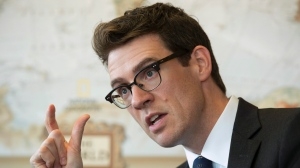Andrew Bennett’s one-week, fact-finding mission begins Monday in Kiev, where he meets religious leaders and government officials, among others. He is also expected to announce a package of Canadian government assistance aimed at promoting religious freedom, democratic development and inter-faith tolerance.
Bennett says the measures will be aimed at mitigating the negative effect of Putin, whom he accused of systematically targeting Christian groups in eastern Ukraine, where pro-Russian militias are active, as well as Muslim Tatars in Crimea, which Russia unilaterally annexed in March. Russian forces have kidnapped priests, detained nuns, firebombed churches and intimidated worshippers, he says.
The Russian forces are targeting the Ukrainian Orthodox Church of the Kyivan Patriarchate, which Bennett sees as part of a plan by Putin to prop up the Moscow Patriarchate of the Russian Orthodox Church. “It’s definitely part of a calculated plan,” Bennett said in an exclusive interview with The Canadian Press. “It’s a narrative drawn from the 19th century, not the Soviet period. This is a narrative building upon Russian nationalism that is rooted in Orthodoxy.
“In Putin’s Russia, we’re seeing again the using of these older constructs within Russian political society and Russian history to advance Russian aims.” Bennett said he’s hearing reports that Russians want all religious communities in Crimea to re-register as religious communities, as they do in Russia. While that would target Muslim Tartars in Crimea, Bennett said it could be used against Catholics, Protestants and Orthodox groups, particularly the Kyivan Patriarchate in eastern Ukraine.
“As it has happened through a lot of its history, the Russian Orthodox Church is allowing itself to be co-opted and is being co-opted by the state, the Russians, to advance Russia’s interests.” Bennett said he won’t travel to Crimea or eastern Ukraine because it is too dangerous.
Bennett also took Putin to task for positioning himself as a defender of religious freedom. In the Middle East, Putin sees himself and Russia as defenders of Orthodox Christians in Syria and Iraq and has spoken out loudly against their persecution, said Bennett. “We all need to speak out,” he said. “But it’s very disingenuous when he does it on one hand in the Middle East and through his proxies they’re persecuting their fellow Christians in Ukraine.”



